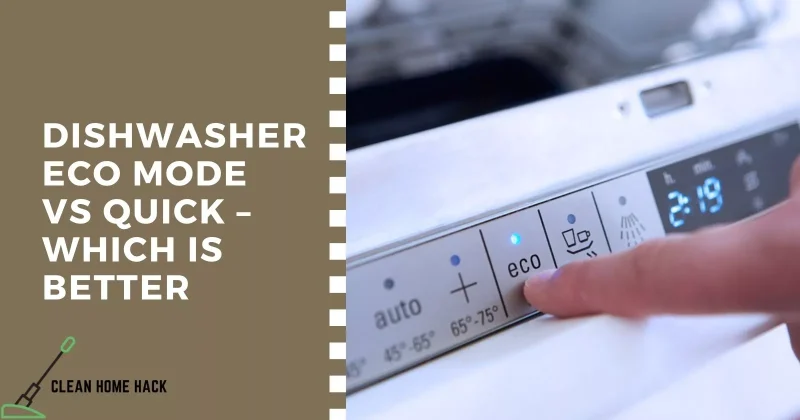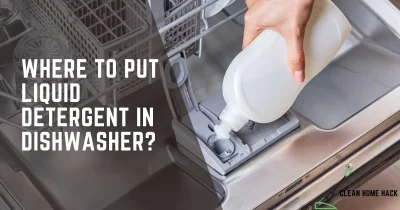Dishwasher Eco Mode vs Quick – Which Is Better

 The Short Answer is: The Short Answer is: |
| When choosing between dishwasher eco mode and quick mode, it depends on your priorities. Eco mode is designed to save electricity by using lower wash and rinse temperatures and minimizing the amount of water required while still achieving a satisfactory threshold for dirt removal. It takes longer to complete a cycle, but it saves energy. On the other hand, quick mode is super-fast and is the better option if you are in a rush and need your dishes cleaned straight away. Quick mode uses more energy and water than eco mode, but it is faster. Ultimately, the best program for you to choose when washing your dishes is the one that’s going to make your life easier. |
When it comes to running a dishwasher, it’s important to choose the right mode to save money and energy. Two popular modes are eco mode and quick-wash mode.
Eco mode is designed to save energy by using less water and washing at lower temperatures, while the quick-wash mode is super-fast and saves time.
But which one is better? In this article, we will explore the question, “Dishwasher Eco Mode vs Quick” We will take a look at the pros and cons of each mode to help you decide which one to use.
Table of Contents
Dishwasher Eco Mode (Features and Benefits)
Dishwasher Eco Mode is an energy-saving program offered across every new dishwasher that allows the appliance to maximize efficiency.
It is essentially just a program that uses lower wash and rinse temperatures so less energy is required for heating, and it minimizes the amount of water required while still achieving a satisfactory threshold for dirt removal.
The Eco mode delivers the lowest energy consumption across different brands and models. It saves both water and energy consumption with this cycle.
In Eco mode, a wash cycle uses 0.73 kWh. Compared to the Auto program, that will save you around 523 kWh over a year. That’s enough to power an energy-saving.
The longer wash cycle in Eco mode means that the water doesn’t need heating up as much when compared to shorter programs. Plus, your dishes are soaped longer, which means your dishwasher doesn’t need as much energy to clean them as other programs.
However, a more efficient wash does mean some trade-off in terms of cleaning intensity, but that doesn’t necessarily mean you’ll be left with dirty plates or clothes.
To achieve perfect results for your dishes and the environment, you should select the program according to the load and how dirty the dishes are.
Benefits of using Dishwasher Eco Mode:
- Saves energy and water consumption
- Delivers the lowest energy consumption across different brands and models
- Saves money on electricity bills
- Decreases water consumption
- Environmentally friendly
Quick Wash Cycle (Efficiency and Convenience)
The dishwasher quick wash cycle is a convenient and efficient way to clean dishes quickly. This cycle is designed to clean dishes in a shorter amount of time than a regular cycle, making it a great option for busy households.
The quick wash cycle typically uses less water and energy than a regular cycle, making it an environmentally friendly option as well. However, it is important to note that the quick wash cycle may not be as effective at removing tough stains and food debris as a regular cycle.
Therefore, it is recommended to use the quick wash cycle for lightly soiled dishes and save the regular cycle for heavily soiled dishes.
Additionally, it is important to follow the manufacturer’s instructions for loading the dishwasher and using the quick wash cycle to ensure optimal performance and efficiency.
Factors to Consider When Choosing Between Eco Mode and Quick Wash
When deciding between eco mode and quick wash, there are several factors to consider. Here are some of the most important ones:
1. Energy Efficiency: Eco mode is designed to save energy by using lower wash and rinse temperatures, which require less energy for heating. On the other hand, quick wash mode is faster, but it may consume more energy. If you are concerned with saving energy, eco mode is the better option.
2. Cleaning Intensity: Eco mode may not be as effective in removing heavy stains or dirt as quick wash mode. However, it still achieves a satisfactory threshold for dirt removal. If you are washing heavily soiled clothes or dishes, quick wash mode may be a better choice.
3. Time: Quick wash mode is faster than eco mode, so it is the better option if you need your dishes or clothes cleaned quickly. However, if you are not in a hurry, eco mode can save you time by allowing you to wash larger loads at once.
4. Water Usage: Eco mode uses less water than quick wash mode, which is better for the environment. However, it may not be as effective in removing dirt or stains, so you may need to run the cycle again.
5. Load Size: Eco mode is more efficient when washing full loads, so it is better to use it when you have a lot of dishes or clothes to wash. Quick wash mode is better for smaller loads.
The best program to choose when washing your dishes or clothes is the one that will make your life easier. If you need your dishes or clothes cleaned quickly, quick wash mode is the better option. If you are concerned with saving energy and water, eco mode is the better option.
Environmental Impact of Each Dishwasher Mode
When it comes to the environmental impact of each dishwasher mode, the eco mode is generally considered to be more environmentally friendly than the quick mode.
The eco mode is designed to save electricity and water, and it uses colder water, which means that it takes longer to run and pumps a lot of water around the dishwasher to soak the food off of the plates.
On the other hand, the quick mode is faster, but it uses higher temperatures to clean dishes, which is not as environmentally friendly as the eco mode.
However, it’s worth noting that the environmental impact of dishwashers is not just determined by the mode used, but also by the efficiency of the dishwasher and how it is used.
Tips for Optimizing Dishwashing Results in Eco and Quick Wash Modes
1. Properly load the dishwasher: Be careful not to block the water streams and spray devices. Also, avoid blocking the spinning arms and rotating bits with any long utensils. Proper loading will ensure that all dishes are cleaned thoroughly.
2. Use the right detergent: Choose a detergent that is specifically designed for the dishwasher and the wash cycle you are using. Using the right detergent will ensure that your dishes come out clean and spotless.
3. Choose the right wash cycle: The quick wash setting works best for everyday items like plates, mugs, and glasses. However, it uses more water than the regular setting. The eco mode is focused on lower energy usage and water conservation, but it may take longer to complete the cycle. Choose the wash cycle that best suits your needs.
4. Use the High Temp Wash option: This option raises the main wash temperature to a minimum of 130°F, which helps improve wash and dry performance when paired with the use of a rinse aid.
5. Rinse dishes before loading: Rinse dishes before loading them into the dishwasher to remove any large food particles. This will help prevent clogs and ensure that your dishes come out clean.
By following these tips, you can optimize your dishwashing results in eco and quick wash modes. Proper loading, using the right detergent, choosing the right wash cycle, using the High Temp Wash option, and rinsing dishes before loading will ensure that your dishes come out clean and spotless every time.
Frequently Asked Questions Related to the Topic:
Is eco wash better than quick wash dishwasher?
Eco-wash is better than a quick-wash dishwasher if you are concerned with saving energy. Eco wash uses less energy to heat and less water, and it delivers the lowest energy consumption across different brands and models.
Although it takes longer than the quick-wash mode, it saves a lot of energy compared to the quick-wash mode. However, if you are in a rush, a quick wash is the program to choose from as it takes less time than any other wash.
Which mode is good for dishwasher?
When it comes to choosing between dishwasher eco mode and quick mode, it depends on your priorities. If you are in a rush, the quick-wash mode is the better option.
However, if you are concerned with saving energy, the slower wash of an eco-mode is the best option to use. It really does save a lot of energy compared to a quick-wash mode.
Eco mode is essentially just a program that uses lower wash and rinse temperatures so less energy is required for heating, and it minimizes the amount of water required while still achieving a satisfactory threshold for dirt removal.
In Eco mode, a wash cycle uses 0.73 kWh. Compared to the Auto program, that will save you around 523 kWh over a year. That’s enough to power an energy-saving lamp for about 28 months.
Is eco mode cheaper than quick wash?
Eco mode is generally cheaper than quick wash because it uses less energy to heat and less water. However, eco mode takes longer to run than quick wash. If you are in a rush, the quick-wash mode is the better option.
Conclusion on Dishwasher Eco Mode vs Quick
In conclusion, when it comes to choosing between dishwasher eco mode and quick wash, it depends on your priorities. If you are concerned with saving energy and water, then the slower wash of an eco-mode is the best option to use.
It saves a lot of energy compared to a quick-wash mode. However, if you are short on time and have lightly soiled dishes, then the quick wash mode is a good option. It is super-fast and uses less water than the eco mode.
It is important to note that the eco mode uses lower wash and rinse temperatures, so it minimizes the amount of water required while still achieving a satisfactory threshold for dirt removal. Ultimately, the choice between eco mode and quick wash depends on your priorities and the type of dishes you are washing.






